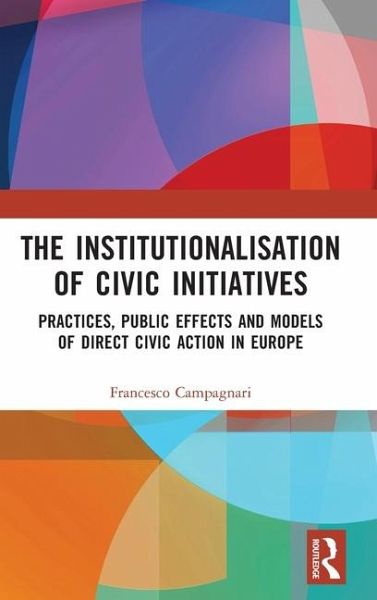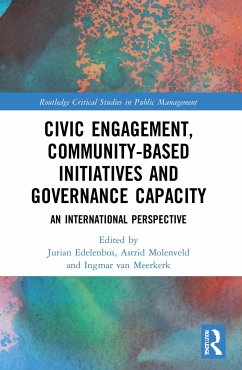
The Institutionalisation of Civic Initiatives
Practices, Public Effects and Models of Direct Civic Action in Europe
Versandkostenfrei!
Versandfertig in 6-10 Tagen
154,99 €
inkl. MwSt.
Weitere Ausgaben:

PAYBACK Punkte
77 °P sammeln!
This book examines two civic initiatives in Europe and analyses their evolution through the institutionalisation of their practices, local public effects, and established models for action at broader scales.Drawing from the concepts of civic action, problematic situations, public problems, and experience, this book coins the concept of direct civic action to explore civic initiatives beyond sectorial categories. It draws from the histories, everyday activities, and encounters with new problematic situations of a Slovak and a French initiative. It analyses the institutionalisation of their inte...
This book examines two civic initiatives in Europe and analyses their evolution through the institutionalisation of their practices, local public effects, and established models for action at broader scales.
Drawing from the concepts of civic action, problematic situations, public problems, and experience, this book coins the concept of direct civic action to explore civic initiatives beyond sectorial categories. It draws from the histories, everyday activities, and encounters with new problematic situations of a Slovak and a French initiative. It analyses the institutionalisation of their internal practices, their public cultural services, the models for action they establish in broader networks of initiatives, and how institutionalisation affects their experimentation and innovation. This book uses two case studies of civic initiatives in France and Slovakia, examining how the experimental and institutionalised approaches to problematic situations of civic initiatives are associated with the generation and continuative reproduction of public goods and policies. It also explores how local initiatives establish national and international networks and models for direct civic action.
This book is aimed at scholars interested in civic initiatives, urban planning, public policies, innovation studies, and urban sociology. It is intended to engage members of civic initiatives by offering insights into organisational dynamics and their impact on public issues. Furthermore, it appeals to public officials and policy-makers who aim to establish policies that promote civic initiatives and encourage direct civic action.
Drawing from the concepts of civic action, problematic situations, public problems, and experience, this book coins the concept of direct civic action to explore civic initiatives beyond sectorial categories. It draws from the histories, everyday activities, and encounters with new problematic situations of a Slovak and a French initiative. It analyses the institutionalisation of their internal practices, their public cultural services, the models for action they establish in broader networks of initiatives, and how institutionalisation affects their experimentation and innovation. This book uses two case studies of civic initiatives in France and Slovakia, examining how the experimental and institutionalised approaches to problematic situations of civic initiatives are associated with the generation and continuative reproduction of public goods and policies. It also explores how local initiatives establish national and international networks and models for direct civic action.
This book is aimed at scholars interested in civic initiatives, urban planning, public policies, innovation studies, and urban sociology. It is intended to engage members of civic initiatives by offering insights into organisational dynamics and their impact on public issues. Furthermore, it appeals to public officials and policy-makers who aim to establish policies that promote civic initiatives and encourage direct civic action.














